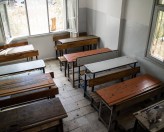
On September 28th, schools across Turkey opened their doors for the start of the academic year.
But nearly 450,000 school-aged Syrian children did not step into a classroom that day. Instead of sitting behind a desk, in a safe learning environment, you see many of those kids in cities across Turkey selling tissues on the roadside, running errands in stores or climbing into dumpsters to collect recyclable materials.
In Hatay, where our field office is located, you might see some in the fields picking the cotton harvest at this time of year.
Every child deprived of an education is at risk of becoming part of a ‘lost generation’.
Even in the early days of the crisis that now engulfs Syria, many ordinary Syrians who fled to Turkey for safety recognised the need to address the lack of education facilities for their children. Ordinary men and women took it upon themselves to rent space, volunteer their time to teach, find desks, chairs and whiteboards all in an effort to ensure their children would not grow up illiterate, and instead have a future for their own families.
The Government of Turkey took a courageous step in 2014 and passed legislation that would bring these informally operating schools under the coordination of the Ministry of National Education. Currently 18,122 Syrian children are enrolled in 69 Temporary Education Centres (TECs) across Hatay province alone. The government of Turkey has shown unprecedented levels of generosity and hospitality – spending up to 8 billion dollars – on refugees from Syria and Iraq. Yet, this is only a small fraction of the overall need. Globally, education and child protection are the two sectors that receive the least amount of aid funding. Partners such as UNICEF and international NGOs like Save the Children are working to help bridge that gap.
But it is not as simple as throwing money at the problem. Meaningful understanding of the actual needs of refugee and host communities coupled with projects designed to address these needs are required. To this effect, we carried out a needs assessment of every Temporary Education Centre in Hatay and revealed a thorough yet stark picture of the varying challenges – from transport to textbooks – faced when trying to provide education to Syrian children.
As the crisis has deepened, the needs of refugees has evolved. It is no longer a matter of providing basic humanitarian relief but enabling refugees to live with dignity and, most importantly, hope for a better future.
I have visited several Temporary Education Centres in Hatay as part of our work. At one TEC, a soft spoken head teacher from Aleppo thanked me for the assistance Save the Children in Turkey was providing. This man is so dedicated that he works six days a week, up to 12 hours a day and has gotten into personal debt so that running water and electricity of the TEC would not be cut off. I could not help myself, I listened to his words of gratitude and told him: “No; thank you. “Without you, these children would not have been getting an education for the past three years. I am sorry the international community has been so slow to come to your aid.”
“Better late than never,” he replied.
Sera Marshall is the Communication Coordinator of Save the Children’s Turkey Programme. For updates on their work on education and child protection follow them on Twitter: @SaveChildrenTR.














